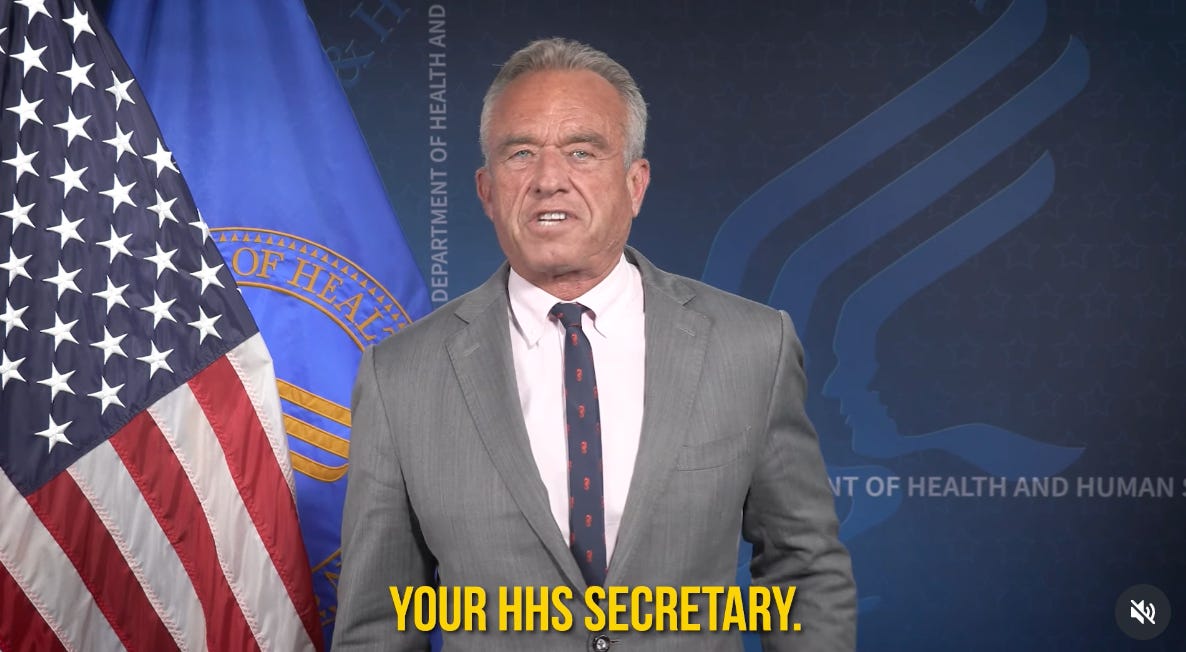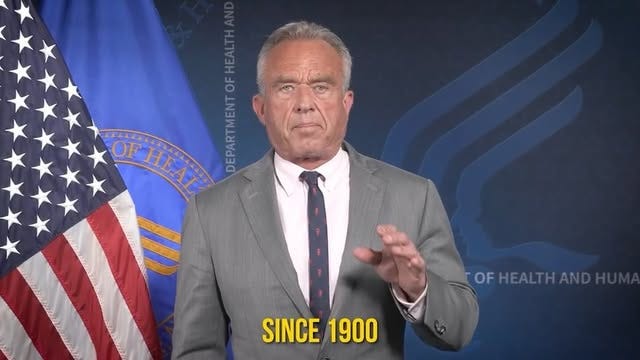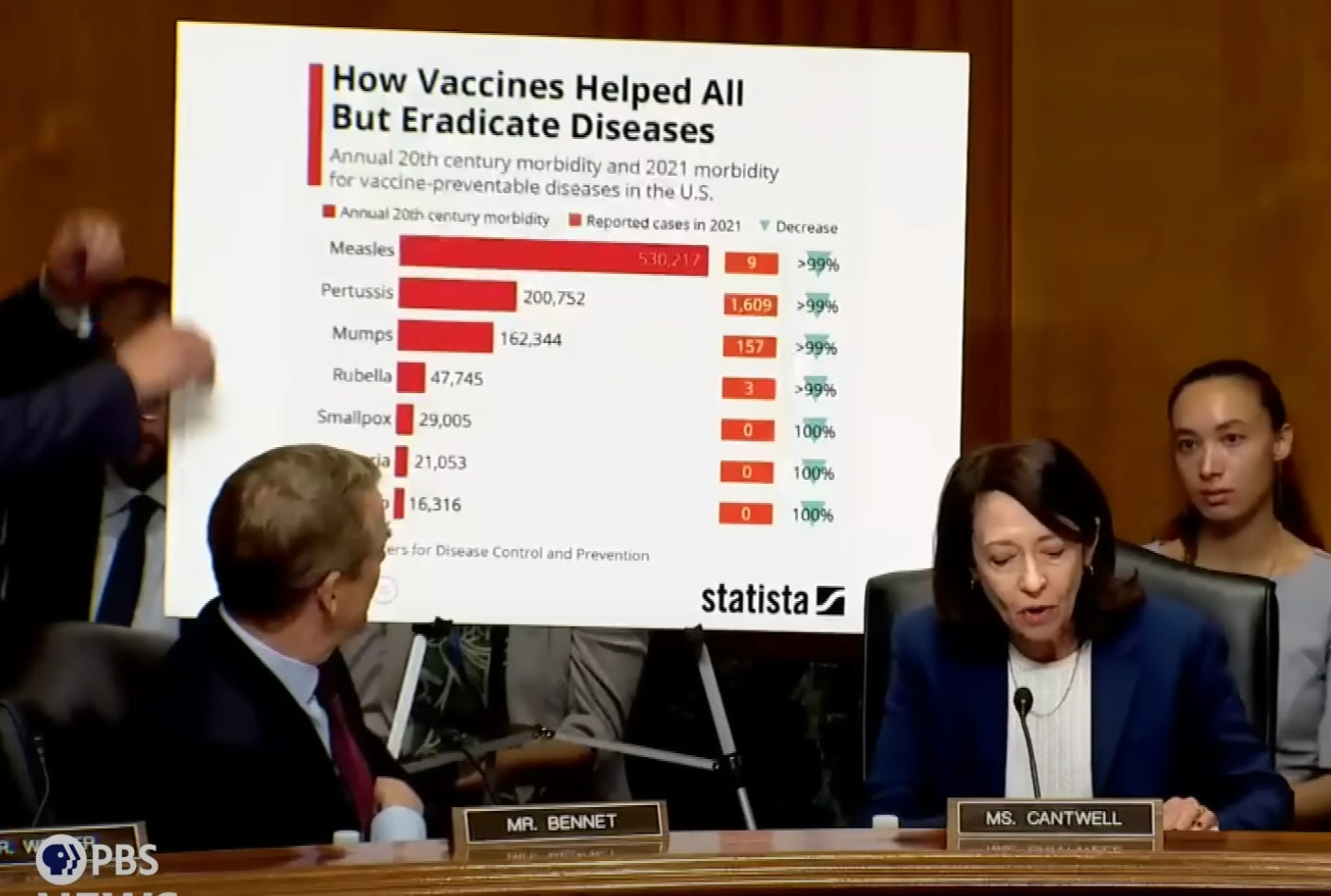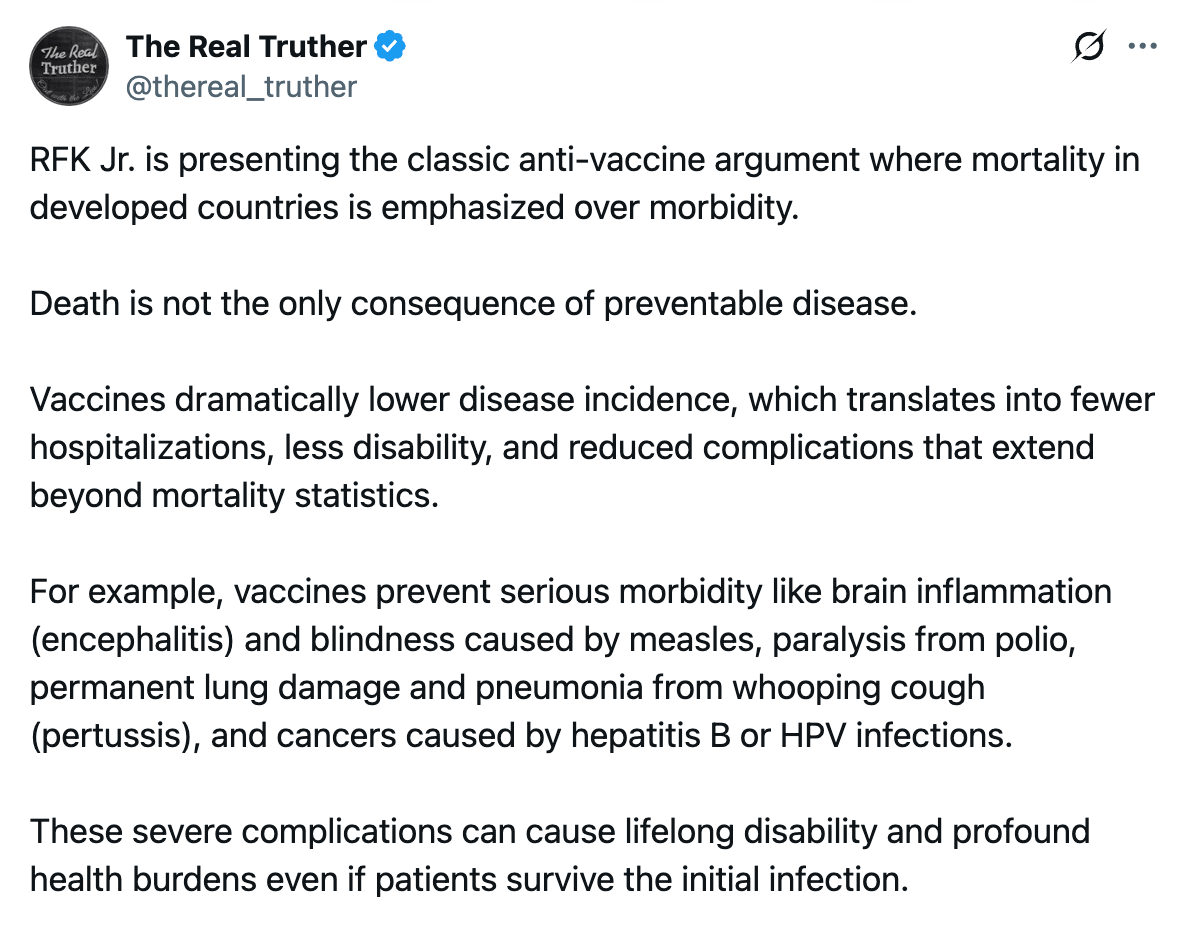How propaganda works
The Kennedy video we knew was coming
Earlier this week, RFK Jr posted an inevitable seven-minute video to his government social media accounts. His thesis: most 20th century infectious diseases were overcome thanks to non-pharmacological interventions (sanitation, nutrition), not vaccination.
As with many things Kennedy says, this thesis begins with a grain of truth. Then comes the propaganda. Let’s look at his techniques, which he repeatedly employs to promote the message that vaccines aren’t actually all that necessary.
The video was filmed to push back on a chart shared by the junior senator from Washington state, Maria Cantwell, which showed decreasing infection rates from measles, pertussis, mumps, rubella, smallpox, diphtheria, and polio in the 20th century.
Importantly, the chart displays morbidity rates, not mortality rates.
Within two sentences, Kennedy mentions Cantwell’s chart (morbidity) before immediately switching to mortality. His first strawman argument. More follow.
The Real Truther dissects this first issue well.
Kennedy then mentions three studies. By considering only part of what each study says, he decontextualizes each to support his own argument—not the supposed “gold-standard science” he regularly claims to be performing.
The first, “Annual Summary of Vital Statistics: Trends in the Health of Americans During the 20th Century,” is invoked to support his thesis: vaccination doesn’t explain significant declines in child mortality and infectious disease mortality before 1940. About 90% of the decline in infectious disease deaths among US children occurred before widespread vaccine availability.
First: this isn’t a hidden secret. Anyone with a working knowledge of vaccine history and public health is aware of this fact. Experts aren’t hiding it. But that’s the conspiracy Kennedy keeps reiterating throughout the video: powerful forces are lying to you by claiming the credit is due to vaccination alone.
Kennedy is very selective in his reading. If he would have continued, a different picture of vaccination occurs in the paper he’s citing.
Vaccines against diphtheria, tetanus, and pertussis became available during the late 1920s but only widely used in routine pediatric practice after World War II. Thus vaccination does not ac- count for the impressive declines in mortality seen in the first half of the century. The reductions in vaccine-preventable diseases, however, are impressive. In the early 1920s, diphtheria accounted for about 175000 cases annually and pertussis for nearly 150000 cases; measles accounted for about half a million annual cases before the introduction of vaccines in the 1960s. Deaths from these diseases have been virtually elimina ted, as have deaths from Haemophilus influenzae, tetanus, and poliomyelitis.
The authors specifically point out the importance of vaccination. While vaccines might not have caused decreases in mortality at that time, they’ve become essential tools in keeping infectious diseases at bay.
Kennedy creates another strawman : a binary in which there’s a secretive group of supposedly pro-pharma people giving all credit to vaccines, when in reality, doctors and public health officials know that vaccines are one tool in a broad public health toolkit.
Kennedy doesn’t stop there. He mines another paper to support his thesis: “The Questionable Contribution of Medical Measures to the Decline of Mortality in the United States in the Twentieth Century” by medical sociologist and epidemiologist John McKinlay and mathematical statistician Sonja McKinlay.
The synopsis is correct: the McKinlays’ were correctly concerned about the growing influence of the pharmaceutical industry in the medical profession and society writ large. This is one place I overlap with Kennedy on. One of the pillars he ran on, during his presidential bid and while campaigning to be Secretary of HHS, was getting the pharmaceutical lobby out of DC. I speculated that he would never do such a thing because, as the largest lobbying arm in the capital, politicians will not readily give up that money—and this applies to both parties. Yet Kennedy has been pretty silent on actually doing anything about it since being installed in his position.
The McKinlays observed the growing power of the pharmaceutical industry and wanted to warn against it. Their paper is important, though experts point out criticisms on their report’s methodology, interpretation of historical data, and broad policy implications.
The report predominantly assessed the mortality decline from infectious diseases and did not fully consider the impact of medical interventions on chronic diseases like cardiovascular disease and cancer, where modern treatments have had substantial effects.
Isolating the effect of medical measures from broader socioeconomic, environmental, and public health factors is methodologically challenging. The statistical models used might have underestimated complex, cumulative effects of medicine over time.
The timing of mortality declines may not account for later medical advances, such as new drugs (antibiotics, anti-hypertensives), improved emergency medicine, and more effective chronic disease management that occurred after the initial decline in infectious disease deaths.
As chronic diseases have become leading causes of death, subsequent research shows medical interventions contributed meaningfully to mortality declines through improved disease management and control, all of which challenges the report’s limited focus.
The report’s conclusion, which suggests health spending priorities should shift away from medicine to social policies, could oversimplify the issue. Preventive care, vaccines, and newer medical technologies have had significant population impacts that were not fully recognized at the time of the report.
We should be spending more money addressing the social determinants of health. It’s not that the government shouldn’t invest more in social policies—something the current administration seems hellbent on not doing. The authors might just have overlooked why we need more medical spending, especially when a major (and correct) criticism of the industry is that pharmaceutical companies predominantly fund their own research. More government money should be funding this. Yet that’s never a solution Kennedy offers.
Here’s the thing about the McKinlay report, and why Kennedy is again being disingenuous: the authors noted that their work has been misused by anti-vaxxers. They explicitly stated that such use of their work is “an egregious misinterpretation.” They’ve also clarified that vaccines play an important role in the ongoing containment of diseases, using measles as an example of how reduced vaccination rates can lead to a resurgence of previously controlled infectious diseases—the same conclusion the last study arrived at.
The final paper Kennedy weaponizes, “Infectious Diseases and Social Change,” was written by Edward H Kass. Like the last few authors, he never argued that vaccines were unimportant or ineffective. In this 1970 address, Kass urged his colleagues to recognize that the long-term decline in mortality from infectious diseases in the 20th century was largely due to broader socioeconomic improvements rather than solely to medical advances like antibiotics and vaccines. Again, fits the thesis.
Kass, like the McKinlays, was rightfully concerned about industry capture. And like the McKinalys, he never dismissed the importance or value of vaccines. He encouraged ongoing vaccination campaigns while hoping that decision-makers would stay abreast of social and environmental drivers of health rather than attributing public health gains to medical intervention alone.
Kennedy is banking on the fact that most people are not going to read these studies. Sadly, he’s correct. I’ve been seeing propaganda from his video repeated verbatim on social media all week.
If you’re going to just repeat what Kennedy says without the same level of skepticism that he’s calling for about the medical industry, you’ll likely rage against conflicting information. That’s how propaganda works: it relies on people taking him at his word.
Kennedy himself said no one should take medical advice from him. But that’s not what he actually wants. What he desires, completely destroying our public health agencies to feed his conspiracy theory-drenched ego and implement pseudoscientific policies, well, tragically, that’s something he’s en route to achieving.







We are in the middle of the largest outbreak of measles in 30 years and new cases continue on a daily basis. It's not just morbidity but also burden of disease.
To me, the key here is that the average person does not know the difference between mortality and morbidity. Using the terms interchangeably suggests they are the same. RFK Jr is going to get a lot of people suffering long term, or even killed, with this kind of misinformation.